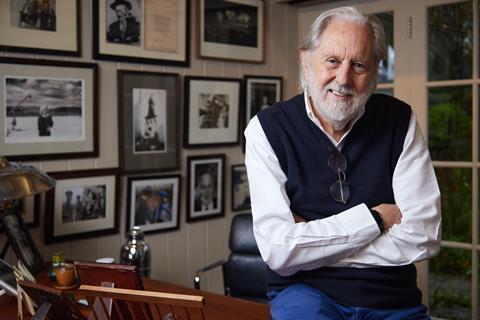On the eve of his retirement as president of the Film Distributors’ Association, David Puttnam calls for radical change in the industry.

David Puttnam may be coming to the end of his 16-year stint as president of the UK’s Film Distributors’ Association (FDA), but a quiet retirement is not on the cards just yet for the 82-year-old industry luminary. The tireless Oscar- and Bafta-winning producer of films including Chariots Of Fire, The Killing Fields, Midnight Express and Local Hero and former chairman of Columbia Pictures still teaches at several universities and is “engaged all the time with young filmmakers”.
He is life president at the National Film & Television School, a Unicef ambassador, sits on or chairs many boards, and remains a trusted voice on everything from education and the film industry to artificial intelligence and the environment. Puttnam’s experience and varied career means that when he talks, the industry tends to take notice.
Today, Puttnam likens the UK film industry in 2023 to the one he entered just over 50 years ago — a sector in a period of transition. “I would absolutely encourage somebody, rather like me in 1970, to come out of an associated industry like marketing, or maybe straight out of college, and say, ‘You know what? This business needs a shake-up, this business needs to be rethought,’” he says.
Puttnam began his career in advertising, rising from messenger to account executive and working alongside Alan Parker and Charles Saatchi at agency Collett Dickenson Pearce. He moved into filmmaking in the early 1970s, producing That’ll Be The Day (1973) and Stardust (1974), both starring pop icon David Essex, for EMI.
“Whereas I didn’t know anything at all about producing movies, I knew a lot about marketing,” he says. “It was the lamentable state of marketing in cinema that I genuinely thought I could get engaged with correcting.”
Puttnam says he was given “an extraordinarily free hand” over almost every aspect of how the films were released. “Instead of sitting around waiting for the normal 10% of your production budget to be spent on a couple of posters for some Underground stations, I went out and looked for other sources of promotion. That was the key to the success,” he recounts of these early releases. They were promoted with a chutzpah more commonly found in the music business than in the then-staid world of UK film distribution.
Industry schisms
Seventeen years ago, when Josh Berger, then MD of Warner Bros UK, came to visit Puttnam in his London flat to see if he might be prepared to take over the presidency of the FDA from former Warner Bros exec Frank Pierce (who had stepped down in 2006), he was immediately interested. “I knew all the players, it was familiar territory. I also thought we could do more than was being done,” he says. “Frank was a hugely respected person but [the FDA] was run in an extremely formal way. My sense was that not a lot got discussed. Why decisions were being made was not always that well articulated.”
The FDA, founded in 1915, represents the interests of distribution companies that acquire, market and release films theatrically. Puttnam took the reins in early 2008, working closely with chief executive Mark Batey and, following Batey’s departure in 2019, with his successor Andy Leyshon. He was the first president who was not a retired distributor.
One of Puttnam’s early innovations was to set up informal quarterly meetings at which distributors could discuss pressing issues in a relaxed environment. He also moved to mend the “schism” that then existed between indie distributors and the majors that are also FDA members.
“I would argue that throughout the whole of my period in the film industry, there has been a built-in faultline [in] the relationship between the bottom lines of the exhibitors and the distributors. I don’t think it has ever been thought through,” Puttnam reflects. “It’s one of my pleas — you’re one bloody industry! When one does well, the other does well.
“Things like windows were ridiculous,” he continues. “They made no commercial sense [but] what had happened was that the exhibitors convinced themselves that any ground they gave ended up making them weaker.”
Puttnam sighs, citing as a perfect example the exhibitor reaction to the arrival of home video. “What many of us were suggesting was that next door to the local Odeon, they [the exhibitors] took a shop and sold videos. It was not to undermine their core business but was a question of customer choice. Any industry that defies its own customers or makes its products harder to buy is stupid.”
The exhibitors missed out on having “licensed videos”, which they would have controlled. “That didn’t happen,” he reflects. “What did happen was that retired taxi drivers and newsagents started opening video shops and we had piracy. Had the industry worked together and with the government from day one, we could have headed all of that off.”
Ask Puttnam what advice he would give to young entrepreneurs hoping to set up independent distribution companies in today’s turbulent market, and he immediately replies: “I could not more enthusiastically encourage them. The distribution business is going through one of those extraordinary changes.”

He talks fervently about the summer successes of Barbie and Oppenheimer as “a very important case study for anyone entering or in the distribution business today”. Puttnam believes that indie distributors will also have the opportunity to harness social media — “effectively, free advertising” — in the same way, and sees a window of opportunity “to rethink the first principles of distribution”.
The ‘Barbenheimer’ phenomenon notwithstanding, he frets about the health of the US studio system. Puttnam was CEO and chairman of Columbia Pictures in the late 1980s. Since then, he fears the majors have become “consumed with their quarterly earnings” and that senior executives are too far removed from creative decision-making.
“The interesting thing in my era was that the personalities of the people running the studios had everything to do with the output,” he says. “I don’t believe that the personalities running those major corporations today can have anything to do with the output other than by hiring and firing people.”
When it came to shaking up the industry, it always helped Puttnam that he had the ear of the politicians. The producer became increasingly active in politics, and less involved in film, in the 1990s, serving as a member of the House of Lords for 24 years until his retirement in October 2021. He believes the Labour government that came to power in 1997 under prime minister Tony Blair had a transformative effect on the UK film industry through its introduction of tax incentives and establishment of the Film Council, which administered the investment of monies from the newly created National Lottery into UK film “franchises”.
Puttnam continues to bang the drum in support of young indie producers. “Independent production is the only R&D that film and television has,” he says. “Take independent production away and there is no Chris Nolan. It would be a very good thing if established filmmakers hammered this point home.”
Marketing shift
This brings him full circle back to distribution and the FDA. “The connective tissue is that those relatively small films don’t receive the kind of advertising and promotional push that the larger ones get,” he says. “Therefore, they end up with quite modest returns.”
What is needed, he suggests, is for someone in the distribution sector to get behind the best indie films and market them as “big movies” rather than niche items. “Every single year there is money left on the floor because there is lack of confidence or lack of push or lack of ambition or maybe just a lack of capital on the behalf of the distributor,” he laments.
A percentage of the profits from Puttnam’s films, including Chariots Of Fire, is still given to the Film & TV Charity. “There is an overwhelming argument, particularly when we have these eras of mega-hits, for producers to do that,” he suggests. “There is no reason not to. Just allocate 2.5% to the industry charity because if things go badly for you, you may well need it. The charity is very well run. It’s 100 years old next year and the calls on its resources have never been greater.
“One of the things wrong with our industry, and maybe I was guilty of it, is that the successful hang onto the goodies for too long,” he concludes. “The conveyor belt of young people bringing in new attitudes, new voices into the industry, takes too long. It is time for new voices to come in, which can speak for their generation.”















![[Clockwise from top left]: Paul Thomas Anderson, Chloe Zhao, Ryan Coogler, Park Chan-wook](https://d1nslcd7m2225b.cloudfront.net/Pictures/274x183/9/0/0/1467900_writerdirectors_192733.jpg)





![[Clockwise from top left]: Paul Thomas Anderson, Chloe Zhao, Ryan Coogler, Park Chan-wook](https://d1nslcd7m2225b.cloudfront.net/Pictures/100x67/9/0/0/1467900_writerdirectors_192733.jpg)
No comments yet